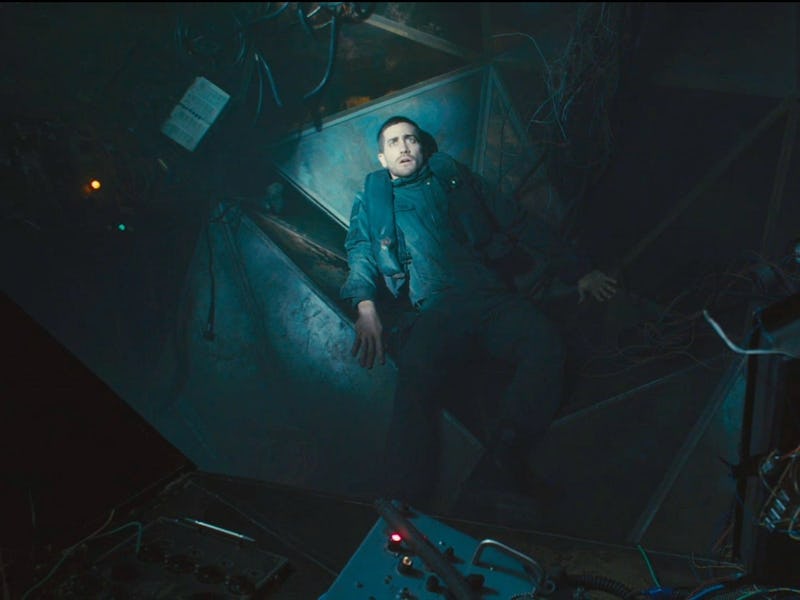This brilliant cyberpunk sci-fi follow-up to Moon just hit Amazon
Duncan Jones’ 2011 sci-fi thriller is every bit as compelling as Moon, if not better.

Although many consider 2018’s Mute to be the “sequel” to the sci-fi indie hit Moon (2009), the truth is, director Duncan Jones made another excellent sci-fi movie in between. And although this one isn’t set in the same fictional universe as the other two, it’s a deeply underrated cyberpunk thriller that’s totally worth another look now that it’s streaming on Amazon.
At the time it was released, Source Code was compared favorably to Groundhog Day, but in this case, you have to imagine Groundhog Day is about a guy reliving one specific moment in the past in order to find out how and why a train was destroyed. The sci-fi tech used to relive these loops is both elegant and implausible. Basically, the main character Stevens (Jake Gyllenhaal) has his consciousness sent back into time and into another person’s body in order to prevent an attack. As in a video game, Stevens has to relive this several times in order to unlock the exact sequence of events that result in stopping the bomb while also saving his long-time friend Christina (Michelle Monaghan).
For sci-fi fans, this set-up is very familiar, and some might argue was done on a bigger, better, and more exciting scale by Tom Cruise and Emily Blunt in the time-loop sci-fi action movie, The Edge of Tomorrow (2014.) But what Source Code has going for it is the combination of blockbuster stakes and the heart of an indie drama.
The script from Ben Ripley also smartly creates limits on the way the time-loops work. In the present, it turns out Stevens is badly injured and essentially being kept on life-support to perform this “Source Code” investigation.
Jeffrey Wright plays Dr. Rutledge, Stevens’ seemingly amoral handler, who initially suggests that this entire exercise isn’t really time travel but rather a simulation for intelligence-gathering after the fact. A late-in-the-game twist changes the implications of the process, which deftly alters the stakes for Stevens. Wright is as good as he always is, and fans of Westworld will see shades of Bernard, as Wright is, once again, tasked with dispensing a bunch of sci-fi exposition and world-building rules. Between this film, Westworld, and The Batman, Wright can make any silly movie mystery seem comprehensible, compelling, and, crucially, real. It’s his superpower, and Source Code wouldn’t work without him.
Jeffrey Wright being extremely Jeffrey Wright in Source Code.
Gyllenhaal is equally good here, too. Like Joseph Gordon-Levitt in 2012’s Looper, there seemed to be a soft trend in the 2010s of pseudo-indie sci-fi movies relying on slightly understated leading actors. And after the brilliance of Sam Rockwell in Duncan Jones’ Moon, Source Code more than proves that that film wasn’t just a one-off.
In fact, in 2011, Source Code seemed to establish Jones (the son of David Bowie) as perhaps the most promising indie sci-fi filmmaker on the planet. After Moon and Source Code, the next near-perfect star-studded indie sci-fi flick wouldn’t really arrive until 2014’s Ex Machina. But Source Code existed in a strange in-between time. the MCU hadn’t quite taken over blockbusters, and even legacy sci-fi franchises like Star Wars and Star Trek were on pause.
It was a quieter time for sci-fi movies, and Source Code reflects that moment for the genre. In some ways, this was a better time for sci-fi movies, even if was just a decade ago.
Michelle Monaghan and Jake Gyllenhaal in Source Code.
Charmingly, Source Code also knows its sci-fi roots. In a bit of meta-casting, Scott Bakula plays Steven’s father. In our world, Bakula is probably still most famous for playing Sam Beckett in the sci-fi classic TV series Quantum Leap (1989-1993). Both Souce Code and Quantum Leap center on the idea of “leaping” into another person’s body, somewhere in the past, in order to prevent a tragedy at a crucial moment. In Quantum Leap, Sam didn’t get a bunch of do-overs, but the spiritual heart of the concepts is essentially identical.
As an indie cinematic successor to Quantum Leap, Source Code is a billion times better than most sci-fi fans probably remember. Should this have been a series? Could it have had a sequel? Thankfully, Duncan Jones left this as a one-off, thus preserving what made it Source Code special: It was small and big all at the same time.
Source Code is now streaming on Amazon Prime.